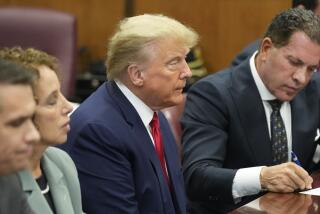Should Witnesses Be Allowed to Sell Their Stories Before the Trial? : No: The prospect of instant riches for a sensationalized version of events creates a grave risk of misrecollection.
- Share via
Assembly Speaker Willie Brown deserves honors for writing a bill that would generally prohibit probable witnesses at criminal trials from being paid for media previews of their testimony. The bill, which is headed for a speedy enactment, is both a fair-trial and free-speech gem: It promotes reliable verdicts and it protects the search for truth in the public domain. Its constitutional moorings are sound, notwithstanding the lonely protests and fertile imaginations of the American Civil Liberties Union and some news organizations.
In 1972, in Branzburg vs. Hayes, the Supreme Court held that the public generally has “a right to every man’s (truthful) evidence,” and that a journalist’s First Amendment privileges do not extend to withholding from a grand jury the identities of confidential informants implicated in or otherwise knowing of crimes.
Brown’s bill fits the Branzburg reasoning like a glove. The government’s interest in all truthful testimony is compelling. But the prospect of instant riches for recollecting a more sensationalized version of events than fits the facts creates a grave risk of witness misrecollection, such as a subconscious or calculated embroidery of the truth. Typically, people come to believe in their false recollections after they have been publicly avowed. As Shakespeare taught, the wish is father to the thought.
Monetary payments for previewing testimony thus interferes with the truth-finding function of criminal trials, even if the witness is exposed to cross-examination.
The allure of a fee for testimonial previews may also impair or scuttle the prosecution’s case. As has already occurred because of the O.J. Simpson media extravaganza, a prosecutor may decline to present witnesses at trial who have received handsome sums for pretrial renditions of their stories because of the likelihood of withering impeachment of credibility on cross-examination. Jurors are likely to be skeptical of tales--incriminating or exculpatory--that have been purchased. But withholding witnesses denies the jury exposure to all pertinent evidence, and thus obstructs its truth-finding task.
Additionally, some might contrive false accusations of crime if they could be commercially rewarded by the media for pretrial retailing of their falsehoods, notwithstanding subsequent acquittals.
In sum, Brown’s legislation deserves plaudits because it erects an important safeguard against monetary corruption of the truth-finding objective of the criminal-justice system. Moreover, the prospect of compensation and its vitiation of truth wars with an overarching purpose of free speech: the discrediting of falsehoods. In any event, the impending law accomplishes its objective with only a trivial impact on free speech. It would not circumscribe uncompensated interviews regarding testimony at any time. And the compensation prohibition unfolds only when the individuals have reason to believe that they will be called as witnesses in a criminal case. Finally, the prohibition lapses after judgment is rendered or on the first anniversary of the crime if prosecution has yet to commence.
There is no constitutional right to profit from expected participation as a witness in a criminal trial, which is a common obligation of citizenship. And the suggestion that a witness’ story is inherently valuable rings hollow; its market value stems from the government’s intent to prosecute, not from its originality and independent newsworthiness.
Opponents object that the prohibition inhibits free speech; that without the prospect of compensation, some people will be discouraged from telling their story at all. Perhaps, but that would be their choice, not an external infringement of constitutional rights. The effect of Brown’s bill is supported by precedent in this regard. Federal law, for instance, puts a ceiling on the outside income that judges, executive officials and members of Congress may earn by speaking, writing or otherwise. Not even free-speech enthusiasts would have the effrontery to claim that the ceiling is an unconstitutional inhibition of orations or opuses that might otherwise command a price.
Brown’s bill will have a significant affect only on the handful of sensationalized criminal dramas that arise in California. But public perception of criminal justice is largely forged from that handful, and confidence in its fairness suffers when checkbook journalism is afoot.
More to Read
Get the L.A. Times Politics newsletter
Deeply reported insights into legislation, politics and policy from Sacramento, Washington and beyond. In your inbox twice per week.
You may occasionally receive promotional content from the Los Angeles Times.










